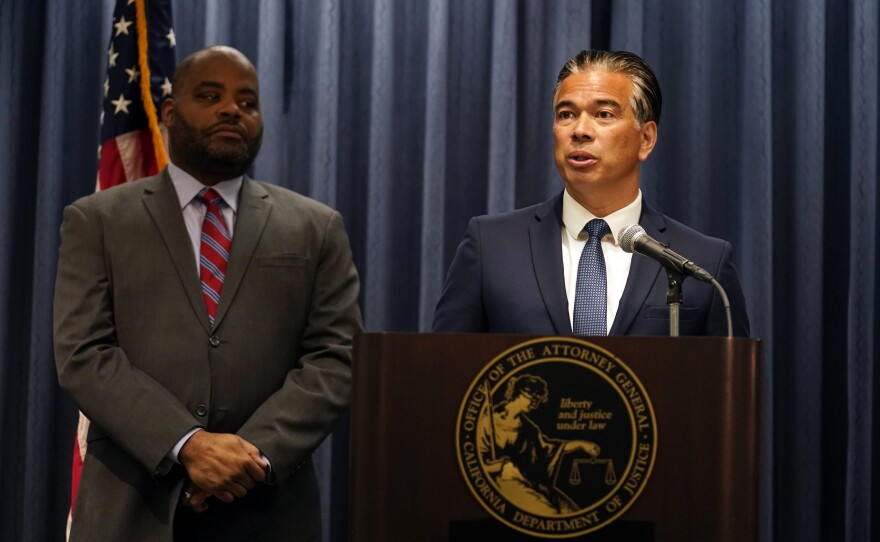California's attorney general sued a Southern California school district Monday over its recently adopted policy that requires schools to notify parents if their children change their gender identification or pronouns.
Attorney General Rob Bonta called the Chino Valley Unified School District's policy a “forced outing” of transgender students that violates their civil rights. He said he is seeking a court order to immediately halt the policy from taking effect.
“It tramples on students' rights,” Bonta told reporters.
The move comes after Chino Valley Unified, about 35 miles (56 kilometers) east of Los Angeles, adopted the policy following a shift in leadership on the school board. Other Southern California districts have adopted similar policies and Bonta said he believes they will also be affected by this litigation, though they are not named in the suit.
Under the policy, Chino Valley schools will notify parents in writing within three days if district employees become aware that a student is asking to be identified or treated as a gender other than the one listed on official records. Parents will also be informed if students are accessing sex-segregated activities such as sports teams or using bathroom facilities that don’t align with a student’s listed gender, according to the policy.
The policy also outlines steps for schools to notify parents of injuries or threats to their children and suicide attempts.
Andi Johnston, a spokesperson for Chino Valley Unified, said the district is working with its attorneys to review the lawsuit and until now has been providing state officials with requested documents in response to a subpoena.
Chino Valley Board President Sonja Shaw, who won election last year, said the lawsuit is no surprise and that state government has repeatedly taken steps “to shut parents out of their children's lives.”
“We will stand our ground and protect our children with all we can because we are not breaking the law,” she said in a text message. “Parents have a constitutional right in the upbringing of their children. Period.”
In several Southern California communities, similar policies have sparked heated debates between those who say parents have a right to know the decisions their children are making at school and those who say that such policies would forcibly out transgender students and threaten the well-being of some of the most vulnerable children.
The fights at school board meetings in California come as states across the country are battling over transgender rights through efforts to impose bans on gender-affirming care, bar trans athletes from girls and women’s sports, and require schools to “out” trans and nonbinary students to their parents.
Bonta’s lawsuit contends that Chino Valley’s policy discriminates against transgender and gender non-conforming students and violates the state constitution’s requirement of equal protection for all students regardless of their gender expression, identity or sexual orientation. It also argues the policy violates students’ privacy rights.
“For far too many transgender children and gender nonconforming youth, school serves as their only safe haven — a place away from home where they can find validation, safety, privacy. We have to protect that,” Bonta said.
Earlier this year, California Republican Assemblymember Bill Essayli introduced legislation to require teachers to notify parents if their child identifies as a gender different from their birth certificate, but the bill never received a hearing.
“That’s when I shifted my focus and started working with school board members to craft local district policies,” he said.
He worked with the California Family Council and other groups to help draft the policy that was voted on at Chino Valley.
“There’s a lot of systems in place to deal with physical abuse of any minor, and I think it’s wrong for the state to presume that parents are a danger and therefore take a blanket policy where they’re going to withhold information from all parents under the auspice that some parents might be harmful to their kids,” Essayli said.
But critics are concerned these policies could pose a risk to students who live in households that are not accepting or abusive.
Jody Herman, a public policy scholar at the University of California Los Angeles School of Law, said requiring school staff to notify parents if their child identifies as trans is taking a “gamble” with someone’s life. Herman pointed to the 2015 U.S. Transgender Survey, a report released by a group of nonprofits, which found that 40% of trans people who were out to their immediate family said they were neutral or not supportive of them.
“Parents are not uniformly accepting,” Herman said. ___ Sophie Austin is a corps member for the Associated Press/Report for America Statehouse News Initiative. Report for America is a nonprofit national service program that places journalists in local newsrooms to report on undercovered issues. Follow Austin @sophieadanna








